If you believe in any sort of afterlife at all, it’s fairly easy to conceptualize our time here on earth as a sort of perpetual adolescence. At all stages of our conscious lives—whether teenage, young adult, middled-aged, or elderly—we’re haunted by the uncertainty of the world around us, riddled with the bullets of life, buffeted by the winds of of our emotions. It is, one might say, tough to be be alive and to make sense of life. And perhaps it’s a bit silly to take a story as patently juvenile as Angel Beats! [P.A. Works, 2010] as a microcosm for the full breadth of human life, but as TK might say, “Get chance and luck!”
One of the more sustained criticisms of Angel Beats! (besides the archetypal complaints about Jun Maeda’s capacities for writing dynamic female love interests or the volleys aimed as the show’s “tearjerker” moments) is concentrated on the anime’s inability to hold tone. It’s not an issue unique to Angel Beats!, nor is it a characteristic that is universally despised. However positively or negatively disposed one is towards the sometimes madcap way this post-mortem story oscillates between comedy and drama, though, the fact that it exists is certain. And it is around that certainty which this reading of Angel Beats!‘s tonal mess as a sort of metaphor for the whole expanse of life revolves.
To see Angel Beats! as a narrative capsule through which the relief of the angst of adolescent is explored is definitely one valid interpretation—and one that has been explored before. To read the show as a thematic musing on coming to terms with the life one has been dealt is equally valid. However, both of these understandings are somewhat compartmentalized—which is not, of course, to say that what Angel Beats! has to say on either topic is weakly stated or useless. It is only really to note that an analysis of Angel Beats! as a structural whole, from the way it tells its story all the way down to the way it handles the minute details of the large casts’ individual quirks, reveals it as something less than entirely cohesive. Which is, incidentally, exactly the point.
How? Because although we grow older and change, and although the mode of the expression of it changes, the existential panic—the hysteria of being alive on this world—never does. In language specific to Angel Beats!…the lyrics of Girls Dead Monster’s hit song, “Alchemy,” never stop accurately representing the convoluted emotions of negotiating the facts of life.
I desperately want to live. All of the days that rushed by look like they’ll disappear,
But I’ll try skipping class, so I shouldn’t be getting tired–my thoughts are inconsistent like that.
It’s like my head was hit somewhere when I wasn’t aware.
Okay, let’s go to the hospital from here for a little while.
Could you leave me some medicine that’ll keep me awake forever?
There’s no clarity in these words beyond the desire to extend. But GlDeMo is only one facet of the SSS, one of the most effective ways they have to fight against “being obliterated” and maintaining the luminal state between death and life, between peace and anxiety. The other SSS operations are neither as glamorous or as unambiguously oriented towards achieving the goal of “fighting God” or as serious in tone. And this is as true on an episode-by-episode level as it is within the episodes themselves. The fan-favorite emotional powerhouse episode, “Episode 3: My Song,” featuring Iwasawa’s poignant story and bittersweet passing from the world of the school, is followed up by the generally comedic baseball episode. The dark, moody episode 6 is succeeded by the absurdity of the fishing trip episode. And, internally, the episodes careen between moments of reflection and moments of hilarity, often with little regard for how either modifies the effectiveness of the other.
In short, Angel Beats! is a messy kind of show—lacking the steadiness to treat all of its dramatic moments with the respect and time they need and operating without the commitment to humor to be fully a comedy. But, out of the show’s wild switches between these two types of storytelling there arises a sort of recursive metatextual resonance; that is to say, the way the Angel Beats! conveys its story parallels the story itself.
Angel Beats! is a story about life, and life is neither neat nor consistent. Life pushes you from tears to laughter to sorrow to joy at will, fragmenting moments from other moments without regard for how things “should” or “ought” to be. There are times when we can only laugh in shock at something horrible and there are times when we weep over things that are beautiful and good. Angel Beats! and its lack of cohesion as a story mimics this same indelible characteristic of life—by jerking haphazardly between Hinata’s near-obliteration as he considers catching the baseball in episode 4 into Yui’s cartoony backbreaking tantrum it achieves the dissonant, disjointed affect of life as a whole, where tragedy and triumph so often coexist.
And this returns us to my opening point and to the reason I have come to believe Angel Beats!, despite its high school setting, is a show with more than a little relevance beyond simply addressing the restlessness of youth and finding peace in your particular situation. By serving, as it were, as a microcosm of a discordant life through its storytelling, it replicates the confusion and the panic of being alive in a life that is frequently at odds with itself and constantly filled with the contradictions of human emotion and natural events. While the adolescent age at which the characters of Angel Beats! is the most recognizable time period in which existential hysteria occurs (on both the cusp of adulthood and just barely over the edge of self-consciousness), their struggles are enhanced and generalized beyond the high school setting by both the spiritual pressure of their purgatorial status and the effects of the text’s storytelling.
Because, as I’ve said, we’re all just teenagers in life. We may grow up, learn more things, see more things, experience more things, be surprised by less and disappointed by more, but we’ll never escape the reality of life’s disorder. Angel Beats!, in its failings to live up to the measures of consistency demanded by conventional good storytelling, manages to link the methods by which it conveys its narrative to the story’s musing on life. Perhaps, by so accurately depicting the tonal wildness of life—whether intentionally or not—it provides itself with the perfect playground in which to encounter life’s tears and life’s laughter.

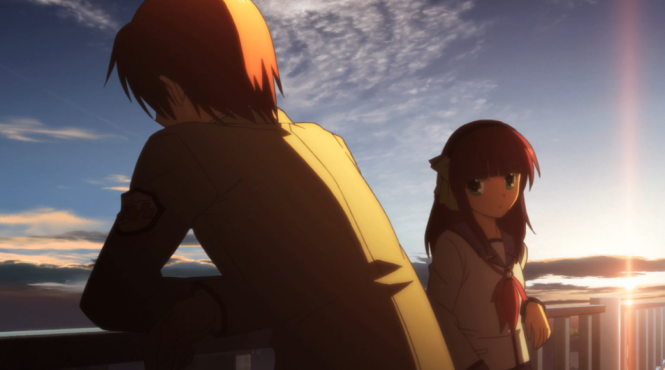
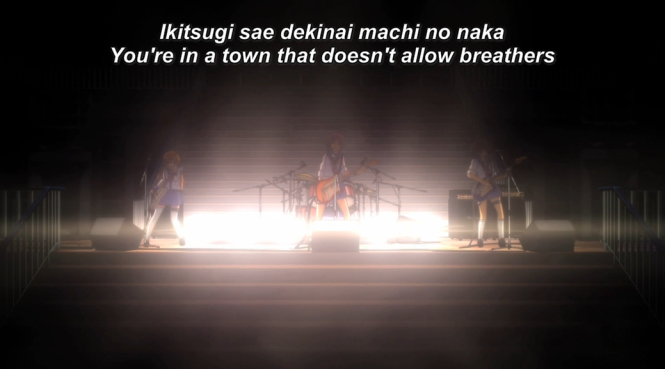
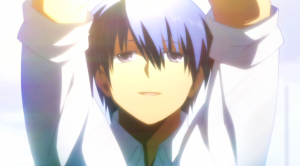
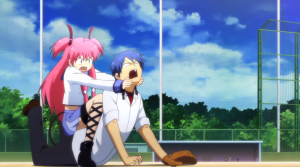
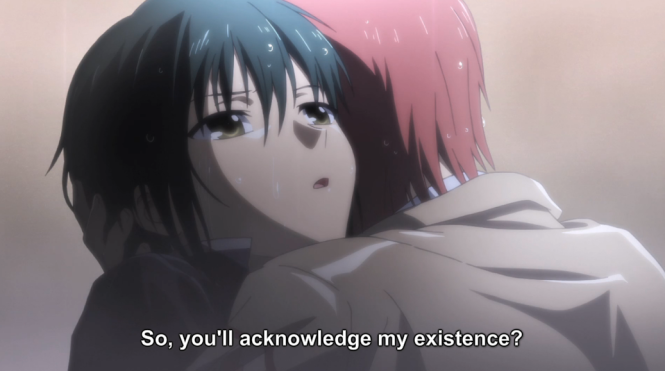
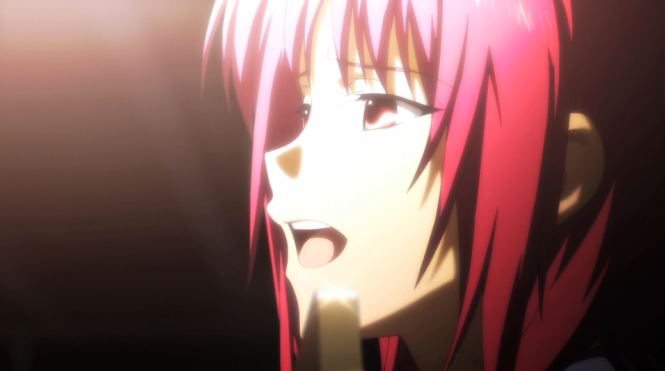
This is exactly how I feel about Angel Beats! The ‘flaws’ divide fans, but for me they often look like Maeda sacrificing the audience’s immediate enjoyment of a show in order to further some thematic question, idea or message. His shifts in tone for comic relief remind me of how Shakespeare would do similarly in his tragedies – the Porter in Macbeth, for instance – poking holes in what would otherwise be too secure and complete to feel human.
I hadn’t thought about the tonality of the show in this way before, so thank you for giving me another perspective to view this ‘perfect playground’ from!
There’s another compliant about the show – that it’s too short – that I tried to tackle on my own blog (https://unnecessaryexclamationmark.wordpress.com/2015/06/26/why-angel-beats-rocks-even-if-its-too-short/) with a similar approach of finding the greater purpose in the ‘flaw’ of the show. I might have to revisit those thoughts with this concept of reflecting reality through tone in mind; I’m already seeing more reasons why the ‘paradise’ of Angel Beats’s world couldn’t stay as long as people would want it too. If the show really does reflect life in its shifting moods, isn’t that even more reason for it to be as fleeting as the characters’ lives in the show?
Great read, thanks for taking the time to put this together.
LikeLike
Eh, well I don’t know if I’d go as far as to compare Angel Beats! to Shakespeare, or as far as to say Maeda did it intetionally—it seems far more incidental than intentional to me…which is fine! It doesn’t invalidate the reading of the show, but yeah…I don’t think this was “planned” per se.
LikeLiked by 1 person
I think Maeda just has Shakespearian touches to his tragicomedy, as most tragedy and comedy writers should.
While Shakespeare was meticulous in designing his plays, a lot of modern screenwriters seem to end up putting in opportunities for deeper interpretations naturally and often not consciously. Dabbling in storytelling myself, I’m already familiar with how things get into your work that you didn’t ‘intend’, but also how those things can link back to you, often implying a kind of subconscious intent.
That’s what I often detect in Maeda; not conscious intent, but rather a more natural appreciation of something that incidentally slips into his work. I think the greatest joys of art are accidents waiting to happen. 🙂
LikeLike
I have never bought into the whole “Angel Beats! is too short, they should have given us more backstories” argument. What they’re saying (to me) is “more virtual children need to be tortured for my amusement”.
Angel Beats! is indeed (as Bless says) something of a mess. But fixing it is more a matter of fine tuning than in turning one element or another up to eleven. It’s a little off balance, not fundamentally broken.
LikeLiked by 1 person
Angel Beats is gets smote
LikeLike
Hai, hai, rest in peace…or try not to get obliterated, eh?
LikeLike
“All tears and laughter” is just the Key formula, which Maeda of all people was surely aware of. It worked for me in, say, Clannad and Little Busters. It didn’t work for me in Angel Beats, and it was hit-and-miss in Kanon (KyoAni version). I haven’t seen Air.
I’ve seen the same criticism (of tonal inconsistency) leveled at Clannad, and to a minor extent to Little Busters. Have you seen any of these shows? Is there a difference, do you think, in which the shows apply the formula?
To be honest, my main qualm with Angel Beats was that it was just… dull. The humour wasn’t funny and the drama wasn’t moving. I can’t be more specific, because I’ve forgotten most of the show (this post, and especially the one in jekojeko’s link showed me just how much I have forgetten), and I’m certainly not sitting through this show again.
I’m curious what this show means to you; do you have a review on this site, somewhere? Does it have to do with the life-after-death aspect you start the post out with? It’s not an important topic to me. (And anime tends to mystify me on this aspect; I also found this year’s darling, Death Parade rather disappointing, taking an entire season to arrive at what should have been the starting point of an interesting exploration, not its result.)
Basically, what I take from your post is that the tonal dissonance can be seen to mirror life. But this, to my mind, simply talks about what I think of as the Key-formula, and doesn’t really tell me anything about Angel Beats in particular. (I also happen too think that it’s far too bi-polar to really represent life; it’s major strength, if used well, is to heighten drama – I’m thinking of the Fuka-arc in Clannad, here, or the resolution of Little Busters ~ Refrain.)
LikeLike
I haven’t seen Clannad or Little Busters (or any of the other Key works, for that matter), so yeah…I’ve got nothing to compare Angel Beats! to in that sense.
And yeah, Angel Beats! is one of my all-time favorites (it’s on my top shows list). It’s been a while since the last time I watched, so I’d probably need another go through it to clearly articulate why I like it as much as I do.
This post specifically, I think came more out of a desire to offer my own take on a common criticism of the show and explain how I see the particular trait as beneficial, rather than harmful to the show’s overall effects. If that makes sense…
LikeLike
I have a problem with that sort of criticism in general, and I think I’d go in the same direction as you on that. It’s just that I don’t see it as specific to Angel Beats. I actually always thought that mixing drama and comedy without any sort of self-consciousness was one of the biggest strength that anime has to offer.
Also, what you said about Angel Beats in the top-shows section makes sense. And I just have to approve a best-of list that includes Kill me Baby, heh.
LikeLike
Thanks for the post. If Charlotte doesn’t sour me on Key forever, I’ll check out Angel Beats
I’ve been gun-shy about Key shows. I’m wading carefully into Charlotte after enduring Little Busters, and just barely enduring Clannad and After-story. Both of those shows are packed with inauthentic characters with nonsensical motivations, situations that strain and break credulity, some creepy, women as fix-it projects, story-arcs, and huge heaping helpings of treacle. When they tried to be funny, they were reasonably successful but when they go for drama, it is a river of tears a mile wide, and an inch deep.
LikeLike
This seems to be a pretty common reaction to Key’s stuff! I definitely understand the frustrations, although obviously they haven’t affected my feelings on Angel Beats! (which remains the only Key show I’ve watched in its entirety since Charlotte‘s only three episodes in).
LikeLike
[…] Speaking of Angel Beats, an interesting of viewing it is as a property about life itself – not just in content, but the show’s very structure, flaws and all. [Mage in a Barrel] […]
LikeLike
[…] Speaking of Angel Beats, an interesting of viewing it is as a property about life itself – not just in content, but the show’s very structure, flaws and all. [Mage in a Barrel] […]
LikeLike